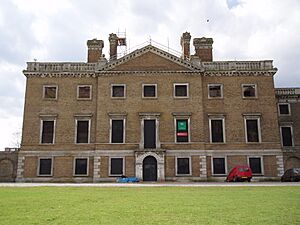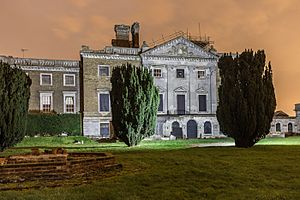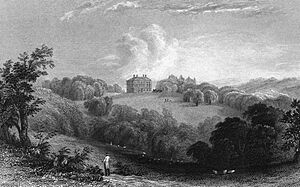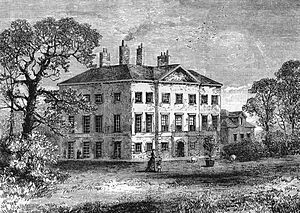Copped Hall facts for kids

Centre of east front
|
|
| Lua error in Module:Location_map at line 420: attempt to index field 'wikibase' (a nil value). | |
| Established | 1995 (purchase by a trust and opened to the public) |
|---|---|
| Location | Epping, Essex Essex United Kingdom |
| Type | General interest museum. Restoration of historic building. |
| Collections | Georgian |
| Owner | The Copped Hall Trust |
| Public transit access | |
| Nearest car park | On site |
| Copped Hall | |
|---|---|
| Built | 1751 |
| Original use | House |
|
Listed Building – Grade II
|
|
| Designated | 1984 |
| Reference no. | 1337306 |
Copped Hall is a beautiful old country house in Essex, England. It was built in the mid-1700s. For many years, it was left to fall apart. But since 1999, people have been working hard to fix it up.
You might hear it called Copt Hall or Copthall too. These names usually refer to the even older houses that stood here before the current one. Copped Hall is easy to spot from the M25 motorway if you're driving between junctions 26 and 27.
Contents
History of Copped Hall
How Copped Hall Began
The land where Copped Hall stands has a very long history. Back in the time of King Richard I, around the late 1100s, the land was given to a family called Fitz Aucher. They owned it for many years.
Later, during the reign of King Edward I (late 1200s), the land became part of an Abbey. It stayed with the Abbey until King Henry VIII closed down many monasteries in the 1500s.
The House's Best Years
In 1564, Queen Elizabeth I gave the estate to Sir Thomas Heneage. He built a grand mansion there. Queen Elizabeth I often visited Essex and even stayed at Copped Hall in 1575.
Later, Sir Thomas's daughter sold the house to the Earl of Middlesex. After him, it was owned by the Earl of Dorset, who then sold it to Sir Thomas Webster in 1701.
In 1739, Edward Conyers bought the estate. He died just three years later. His son, John, inherited the property. The old house was in bad shape. John decided to build a brand new house on a different spot. This new house, which is the one we see today, was built between 1751 and 1758. The old house was taken down around 1748.
The new house was built in the Georgian style. It was a large building surrounded by beautiful landscaped gardens. The gardens had a special hidden ditch called a "ha-ha." This allowed people to enjoy views of animals in the fields without the animals being able to get into the main garden. The house was known for its beautiful design and its setting in the landscape.
John Conyers' son, also named John, inherited the house next. He made many changes to the building.
When the House Fell Apart
The next owner, Henry John Conyers, was said to be very focused on hunting. Because of this, the house was not looked after as well. The family sold Copped Hall in 1869.
A man named George Wythes bought it. He had become rich by building railways around the world. In 1910, Country Life magazine featured Copped Hall with many photos.
Sadly, in 1917, a fire started by an electrical problem badly damaged the main house. The Wythes family, who lived there, moved to another house on the estate called Wood House.
After the Wythes family left in the 1950s, Copped Hall was completely neglected. People took valuable building materials from the house. The orangery, a special greenhouse, was even blown up during an army training exercise in the 1960s. All the statues and stone decorations from the gardens were sold and moved to other estates.
In 1995, the ruined house was used as a location for a music video by the band The Cranberries.
Bringing Copped Hall Back to Life
In 1995, a group called the Copped Hall Trust bought the house, its smaller buildings, and the gardens. They have been slowly restoring everything. You can visit the house on certain days to see the progress. They are working to make it look like it did in the Georgian era. The parkland around the house is now owned by the Conservators of Epping Forest.
On April 27, 2004, Charles, Prince of Wales (who is now King Charles III), visited Copped Hall. He looked at the restoration work. He also opened an art show featuring 18th-century botanical paintings. These paintings were done by Matilda Conyers, the daughter of the John Conyers who built Copped Hall.
A group called the West Essex Archaeology Group (WEAG) holds yearly digs at Copped Hall. They mostly look for remains of the older Tudor house that was there before the current Georgian one. They have weekends for beginners and longer sessions for more experienced archaeologists.
Wood House
Wood House is another home on the Copped Hall estate. It was built in 1895 by Ernest James Wythes. He moved there after the main Copped Hall house was damaged by fire in 1917. He stayed at Wood House even after Copped Hall was rebuilt. The famous singer Rod Stewart lived in Wood House for several years before selling it in March 2019.
Images for kids
 | Frances Mary Albrier |
 | Whitney Young |
 | Muhammad Ali |











